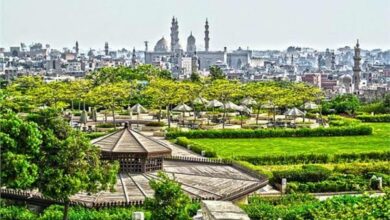
With 35 million people in Egypt concentrated in urban centers and 32 percent of the overall population residing in Cairo, according to a 2012 World Bank report, it makes sense to rethink Egypt’s urban ecology and the role trees can play in reducing pollution and mitigating the impact of climate change.
The environmental association Shagara reflects this mindset. It considers trees lifesavers that could help the country overcome serious environmental issues while spreading green awareness among public school students.
Mohamed Ashraf Abdel Samad, the association’s founder, developed a profound interest in sustainable development and green economy while pursuing his bachelor’s degree in Norway and master’s degree in Belgium.
“These subjects teach you how to make a profit while having a positive impact on the environment,” says Abdel Samad.
Upon returning to Egypt, he decided to spread his newly found knowledge and create Shagara. “Shagara is a non-governmental association with three important objectives,” he says. “Our goals are threefold: reducing the amount of pollution, increasing environmental awareness among the public, especially children, and combating poverty,” he says.
Abdel Samad believes that children are especially important in the battle for a greener Egypt. That includes farming practices and afforestation, which is the establishment of a forest, or in this case, a group of trees in an area where there is no forest.
Shagara hopes to combat poverty by teaching families how to establish small-scale house farms where they can plant different kinds of fruit trees and vegetables such as tomatoes, mint and parsley, in addition to endangered indigenous species like acacia, sycamore and fig trees.
“Because it is difficult to increase environmental awareness among people who can barely make a living, we insist on the economic benefits first and explain the health and ecological interests later on,” he says.
Abdel Samad says these small farms should increase families’ income and raise their standard of living, which would generate interest among other community members to start their own small vegetable gardens.
In addition to planting trees in areas such as Maadi, Manshiyet Nasser and Shabramant, and teaching people there how to grow plants on their rooftops, the association adopted the “A tree in the school” initiative to help spread green awareness among public-school students.
“We started our initiative in Hassan Abu Bakr School in Qanater, where we got the children involved in the farming processes. Some of them have spread the idea to their own homes,” Abdel Samad notes.
But he says the project initially faced many difficulties.
“Bureaucracy was the main obstacle as it took a whole year to finish the necessary papers for establishing the association, and another year to get the security clearances and permission from the Education Ministry to start working in schools,” he says. “Even the school administration wasn’t very cooperative.”
Abdel Samad says the project would have reached a dead end without help from Prime Minister Hesham Qandil. He says government institutions need to be reformed and the mentality of employees changed.
“I could not believe it when one of them told me, ‘You’re either doing this for money or because you’re a spy,’” Abdel Samad adds.
Believing that improving the environment is a national duty in which everyone must take part, architect Mohamed Salah Hedayat was one of the first volunteers to join the Shagara team.
He says Shagara isn’t merely about planting gardens on rooftops, or for schools.
“We also aim at improving the fields of sustainable architecture, which are still very primitive in Egypt. In the long term, I dream of finding alternative environmentally friendly construction materials that can replace the existing ones used in traditional buildings,” he says.
These sustainable materials could include rice straw, earth-bags, mud or stones that act as insulators, maintaining a cool temperature inside the house and reducing the need for air conditioning. Better insulation would lower the cost of electricity bills and help reduce incidences of blackouts, which occur regularly during the summer.
“I believe that Egypt has the resources to establish a strong, green economy,” Abdel Samad says. “Building a new economy in a sustainable way will help solve a lot of Egypt’s environmental problems and guarantee good profits at the same time.”
This piece was originally published in Egypt Independent's weekly print edition.


